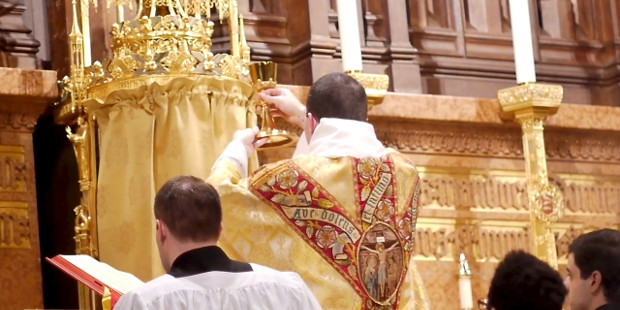
[ad_1]
(InfoCatólica) The main points of Traditionis Custodes are as follows
Article 1. The liturgical books promulgated by Saint Paul VI and Saint John Paul II, in accordance with the decrees of the Second Vatican Council, are the unique expression of the lex orandi of the Roman rite.
Thus, the one indicated by Benedict XVI in Popes:
Article 1.- The Roman Missal promulgated by Paul VI is the ordinary expression of the “Lex orandi” (“Law of prayer”), of the Catholic Church of the Latin rite. However, the Roman Missal promulgated by Saint Pius V, and again by Blessed John XXIII, must be regarded as an extraordinary expression of the same “Lex orandi” and enjoy the respect due to its venerable and ancient use. These two expressions of the “Lex orandi” of the Church in no way induce a division of the “Lex credendi” (“Law of Faith”) of the Church; indeed, these are two uses of the Roman rite alone.
Art. 2. Corresponds to the diocesan bishop, as moderator, promoter and guardian of the whole liturgical life of the particular Church entrusted to him, to regulate the liturgical celebrations of his diocese, it is therefore his exclusive competence to authorize the use of the Roman Missal of 1962 in his diocese, according to the directives of the Apostolic See.
Article 3. The bishop of the diocese in which there are until now one or more groups which celebrate according to the Missal prior to the reform of 1970.
- § 1. must determine that these groups do not deny the validity and legitimacy of the liturgical reform, dictated by the Vatican Council II and the Magisterium of the Supreme Pontiffs;
- § 2. to designate one or more places where the faithful adhering to these groups can meet for the Eucharistic celebration (however, not in parish churches and without the erection of new personal parishes)
- § 3. Establish in designated places the days on which the Eucharistic celebrations are authorized using the Roman Missal promulgated by Saint John XXIII in 1962. In these celebrations, the readings are proclaimed in the vernacular, using the translations of the Holy Scriptures. approved for liturgical use by the respective Episcopal Conferences;
- § 4. Appoint a priest who, as delegate of the bishop, take charge of these celebrations and the pastoral care of these groups of the faithful. This priest must be qualified for this responsibility, must be skilled in the use of the Missale Romanum before the 1970 reform, must have sufficient knowledge of the Latin language to fully understand the rubrics and liturgical texts, and must be encouraged by a living pastoral charity. and a sense of ecclesial communion. This priest must have in his heart not only the correct celebration of the liturgy, but also the pastoral and spiritual care of the faithful;
- § 5. Proceed appropriately to verify that canonically erected parishes in favor of these devotees are effective for their spiritual growth, and determine whether they are retained or not;
- § 6. be careful not to allow the creation of new groups.
Art. 4. Priests ordained after the publication of this Motu Proprio, who wish to celebrate using the 1962 Missale Romanum, must present a formal request to the diocesan Bishop, who will consult the Apostolic See before granting this authorization.
Art. 5. The priests who already celebrate according to the Missale Romanum of 1962 should ask the diocesan bishop for permission to continue enjoying of this faculty.
Article 6. Institutes of consecrated life and societies of apostolic life, established by the Pontifical Commission Ecclesia Dei, fall within the competence of the Congregation for institutes of consecrated life and societies of apostolic life.
Article 7. The Congregation for Divine Worship and the Discipline of the Sacraments and the Congregation for Institutes of Consecrated Life and Societies of Apostolic Life, for matters of their particular competence, exercise the authority of the Holy See with regard to compliance with these provisions.
Art. 8. Previous rules, instructions, permits and customs are repealed not in accordance with the provisions of this Motu Proprio.
Pope Francis accompanied the “Apostolic Letter” with a letter addressed to bishops who touch on the same aspects. Both are only available in the original version in Italian and English and strangely not, at least, in French.
End of one of the main legacies of Benedict XVI
Recently the Cardinal Sarah said What “In history, Benedict XVI will be remembered not only as a great theologian, but also as the Pope of the ‘Summorum Pontificum'”. A wish of the pontiff which ends today.
He also said that “The liturgical crisis has caused a crisis of faith. Likewise, respect for the two ordinary and extraordinary forms of the Latin liturgy will lead us to a missionary impulse of evangelization, and we will finally be able to get out of the tunnel of crisis ”. An “extraordinary form” which today has ceased to exist.
[ad_2]
Source link
 Naaju Breaking News, Live Updates, Latest Headlines, Viral News, Top Stories, Trending Topics, Videos
Naaju Breaking News, Live Updates, Latest Headlines, Viral News, Top Stories, Trending Topics, Videos